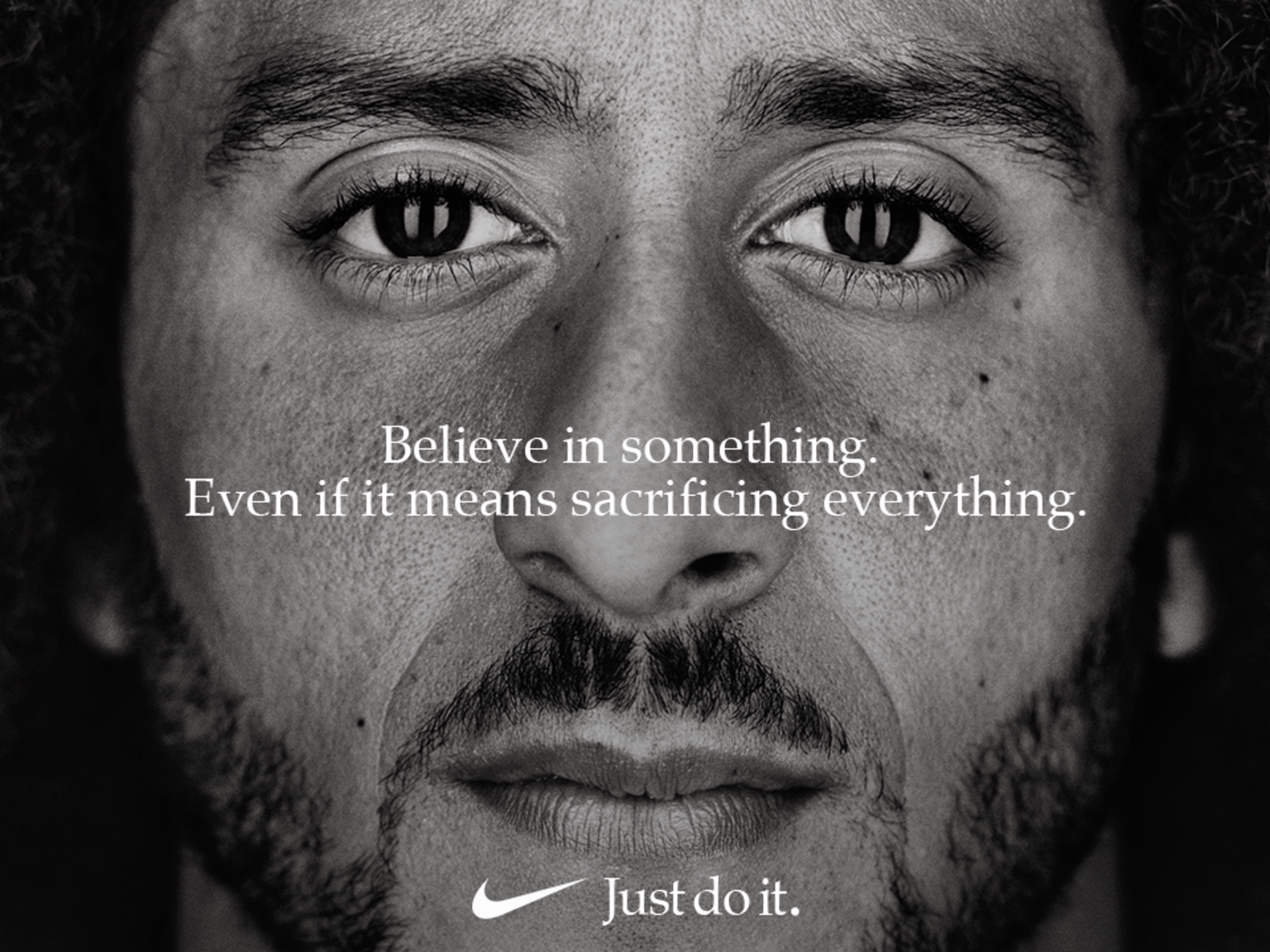30 Years of Just Doin’ It
In recent years global brands have been more challenged to demonstrate not just the value, worth and providence of their products but also to actively show their existential role in a cultural, social and indeed environmental context. Appealing to customers to engage with them long term, develop loyalty and differentiate core products from competitor brands is a strategic imperative in the multi-media landscape in which brands find themselves within vying for customer income.
Nike is celebrating 30 years of Just Doing It in 2018….and their ground breaking campaign which launched in September- focusing on Colin Kaepernick – is certainly garnering the full attention a celebratory year would deserve.
Provocative advertising campaigns and controversial stars are certainly part of the Nike playbook. We can all remember the profiles of Lance Armstrong, Tiger Woods and Oscar Pistorious as Nike brand ambassadors who developed into more “toxic” characters with very controversial narratives.
The Kaepernick Campaign
The advertising campaign itself is impressive, professional and poignant, capitalising on Kaepernick’s celebrity status, the Resistance movement and provocatively taking sides in a bitter feud that has divided the USA and beyond. The advert does not actually mention anything about the protests but cleverly allows the audience to interpret the messages.

Are great brand campaigns brilliant strategic masterstrokes from excellent marketing executives (such as those forward thinking intellectuals who subscribe to The Brand Berries perhaps..) or are they decisions made to create the best possible scenario from potentially explosive and damaging situations…….?
Believe in something, even if it means sacrificing everything.
Recent stories from within Nike do perhaps lend a new meaning to the slogan used. Sources now say that the controversial figure of Kaepernick was perhaps regarded as too difficult to handle and that in 2017 it was likely that he would be cut from the Nike athlete stable as he had been cut from the NFL. The NFL have had a lucrative partnership with Nike since 2012 and the financial costs and reputational damage to either brand could be both significant and longer term. A controversial star who was not actually playing any football and was shunned by the NFL as a whole, and who also drew criticism from the US President was the high risk challenge no brand manager wants to bet on…..
Angering the NFL and its lucrative marketplace was a risk but so was cutting a sporting figure who has become a key political and social lightning rod of the current US times. The Nike deal with the NFL began in 2012 and involves a $220 million a year official partner sponsorship with a 10 year extension only formalized in March 2018
Nike’s brand always wished to be embedded in a young, urban market, the same market who regarded Kaepernick as a hero, not as an anti-patriot. Also Kaepernick was still shifting sports merchandise even as a non-playing, unsigned QB. Kaepernick has effectively become a civil rights entrepreneur but according to recent investigative journalism reports the Nike corporate team had very nearly terminated their contract with Kaepernick. Lawyers acting for Kaepernick were also active in telling Nike that it was not living up to its obligations as the company had kept him within its stable of athletes but were not using him.
The Nike strategy, to risk angering the NFL (which Kaepernick was taking legal action against) but benefit from supporting a popular cause in a key demographic seems to have made good business sense. Mark Parker the CEO of Nike has recently told Wall Street business analysts that the campaign has yielded “record engagement with the brand and has resonated with consumers. A Wall Street analyst has called the campaign a “stroke of genius” and in late September Nike stock was at an all time high.
Those disgruntled with Nike have been widely publicised – cutting the Nike logo from merchandise, burning training shoes and actively demonstrating their displeasure on social media.
The economics so far bear out the Nike decision as a risk worth taking with 61% more merchandise sold since the campaign started (Thomson Reuters/NY Post 09/19/18)
Nike seem to have made a positive strategic decision for their brand despite the fact that the decision was probably forced upon them by circumstances. Had they dropped Kaepernick they would have suffered criticism and a drop in sales but aligned themselves more fully to a powerful brand in the NFL which may have longer term benefits.
The latest financial figures seem to support the Kaepernick campaign as the right one for the Nike brand in the immediate future. A 10% rise in revenue and a 15% jump in profits has been reported. The quality of the advert for the Dream Crazy campaign also makes a massive difference. The market research and demographic elements are key too. 70% of Nike customers are under 35 a key demographic who support Kaepernick.
This may be the future of brand engagement as a great example of Capitalism and Activism adding up to more than just a Corporate Social Responsibility project. In this particular case Nike are a brand profiting not just from a powerful and emotive social cause but also are demonstrating that brand strategy can be a high risk game in which tactical and strategic decisions are often crucial and need to be timed exactly.
If we use the NFL as an example in this sporting metaphor we must also be aware that one adventuress campaign can generate great results but that the whole season may be harder to predict.
It is interesting to theorize that the public at large may care more about the products they are purchasing than the political issues of the time. High profile Brands have powerful reach into audiences at all levels but they are increasingly balancing their profits with their purpose in a complicated and dynamic marketplace which can be difficult to predict and even harder to embrace without managing risk, managing rewards and maintaining a strong brand purpose.





